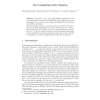9 search results - page 1 / 2 » An improved approximation algorithm for the partial latin sq... |
SODA
2003
ACM
13 years 5 months ago
2003
ACM
Previous work on the partial Latin square extension (PLSE) problem resulted in a 2-approximation algorithm based on the LP relaxation of a three-dimensional assignment IP formulat...
STACS
2007
Springer
13 years 10 months ago
2007
Springer
We present a (2 3 − o(1))-approximation algorithm for the partial latin square extension (PLSE) problem. This improves the current best bound of 1 − 1 e due to Gomes, Regis, an...
ALGORITHMICA
1999
13 years 4 months ago
1999
In this paper, we consider the following question: what is the maximum number of entries that can be added to a partially lled latin square? The decision version of this question ...
LATIN
2004
Springer
13 years 10 months ago
2004
Springer
We consider the problem of protein folding in the HP model on the 3D square lattice. This problem is combinatorially equivalent to folding a string of 0’s and 1’s so that the s...
GECCO
2008
Springer
13 years 5 months ago
2008
Springer
XCS with computed prediction, namely XCSF, has been recently extended in several ways. In particular, a novel prediction update algorithm based on recursive least squares and the ...

